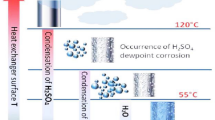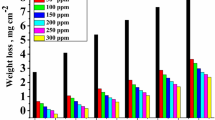Abstract
DURING an investigation into the influence of speed of flow on the internal corrosion of mild-steel tubes, an interesting and unusual form of corrosion product occurred. The tests were carried out with annealed 5/8-in. bore pipes through which Metropolitan Water Board water was flowing at 56° C. at a speed of 430 ft./min. The initial alkalinity of the water was 195 but fell rapidly during the first three days of the test to 75 and gave an overall mean of 76 (expressed as p.p.m. calcium carbonate). The mean pH value was 8.8.
This is a preview of subscription content, access via your institution
Access options
Subscribe to this journal
Receive 51 print issues and online access
$199.00 per year
only $3.90 per issue
Buy this article
- Purchase on Springer Link
- Instant access to full article PDF
Prices may be subject to local taxes which are calculated during checkout
Similar content being viewed by others
References
Mayne, J. E. O., J. Chem. Soc., 129 (1953).
Author information
Authors and Affiliations
Rights and permissions
About this article
Cite this article
BUTLER, G., ISON, H. An Unusual Form of Corrosion Product. Nature 182, 1229–1230 (1958). https://doi.org/10.1038/1821229a0
Issue Date:
DOI: https://doi.org/10.1038/1821229a0
This article is cited by
Comments
By submitting a comment you agree to abide by our Terms and Community Guidelines. If you find something abusive or that does not comply with our terms or guidelines please flag it as inappropriate.



